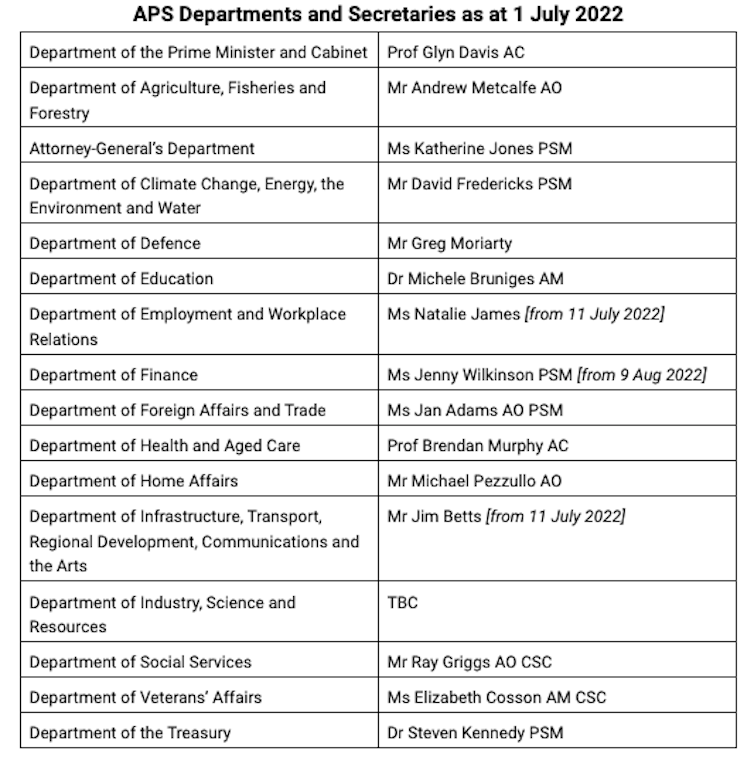Head of Foreign Affairs Kathryn Campbell ousted in public service shake-up
- Written by Michelle Grattan, Professorial Fellow, University of Canberra

The secretary of the Department of Foreign Affairs and Trade, Kathryn Campbell, has been replaced in a shake-up of federal departmental heads announced by Prime Minister Anthony Albanese.
The new secretary will be Jan Adams, who is presently ambassador to Japan and has previously served as ambassador to China. She was Australia’s ambassador for climate change when the now foreign minister, Penny Wong, was climate change minister in the Rudd government.
In the changes the government has brought in two people from outside the federal service. Three of the four new secretaries are women. When Scott Morrison sacked five secretaries in 2019, three were women.
The removal of Campbell has been widely anticipated. Before the election Wong questioned her sharply at Senate estimates. Campbell has been DFAT secretary less than a year. Formerly she served as secretary of the departments of social services and human services, and was embroiled in the Robodebt disaster.
Albanese said Campbell would “be taking up a senior appointment in the Defence portfolio in an AUKUS-related role”.
In the changes, Jenny Wilkinson, a deputy secretary at Treasury, will become head of the Finance Department. She is a former head of the Parliamentary Budget Office. Wilkinson replaces Rosemary Huxtable, who had indicated for some time she intended to retire.
The new Department of Climate Change, Energy, the Environment and Water will be headed by David Fredericks, who shifts from his present position as secretary of the Department of Industry, Science and Resources.
Natalie James, a partner at Deloitte Australia, becomes secretary of the Department of Employment and Workplace Relations. She has had wide experience in public service and workplace relations, including being the Fair Work Ombudsman for the Commonwealth.
Jim Betts, who has worked in the NSW and Victorian public services, becomes secretary of the Department of Infrastructure, Transport, Regional Development, Communications and the Arts. He replaces Simon Atkinson, who was regarded by Labor as too close to the Coalition. Atkinson served as a ministerial adviser from 2013-16 and cabinet secretary from 2017-18.
In a farewell message to staff after the announcement Atkinson said: “It is critical that the secretary is the right fit to lead and provide advice and keep the department well connected to ministers.”
The appointment of Gordon de Brouwer as secretary for public sector reform, in a return to the public service, is further evidence of Albanese’s determination to re-invigorate the bureaucracy. De Brouwer will report to the minister for the public service, Katy Gallagher.
After the election Albanese appointed Glyn Davis as head of the Department of the Prime Minister and Cabinet. Part of Davis’s brief is to drive change in the service, which has been run down under the Coalition government.
Labor is committed to cutting the use of outside consultants, which reduced the role and capability of the public service. Both Davis and de Brouwer were members of the Thodey review of the service – the former government refused to take up many of its major recommendations that would have made the senior levels of the service more independent.
Albanese said a new secretary of the Industry Department would be announced soon.
Authors: Michelle Grattan, Professorial Fellow, University of Canberra





